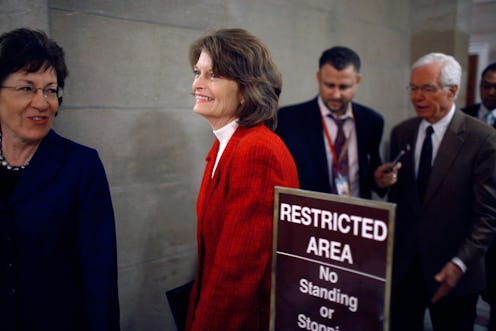News
Two Women Actually Saved Obamacare, But Here's Why A Man Is Getting All Of The Credit

Early Friday morning, in a stunning moment that saved millions of Americans from losing access to health care, the so-called "skinny repeal" of Obamacare failed in the Senate. The loss leaves Trump's plan to "replace and repeal" the former administration's landmark health care policy in tatters, and Sen. John McCain, a surprise "no" vote, has gotten much of the credit. Yet, two women in the Republican Party — Susan Collins and Lisa Murkowski — spent the week standing firm against the latest iteration of the bill, and haven't received full credit for their sheer persistence in doing so.
For many women, this won't come as a surprise. As put by comedian Jenny Yang in a tweet early Friday morning: "Giving McCain the credit for defeating this repeal when female Senators Murkowski & Collins were early NOs is EVERY WORK MEETING EVER."
When asked by researchers about their experiences being undermined by men in the workplace, many women have reported it to be a common occurrence. One study found that men get more credit than women for work shared equally; another revealed that women economists who co-author papers with men are less likely to receive tenure than those men. Another found that women were more likely to not speak up about their accomplishments when they work with men. Women are also punished by the general public for revealing anger; when men display feelings of anger publicly, a Yale research paper showed, they are rewarded for it.
And Collins and Murkowski have faced more than their share of male anger. Earlier this week, Rep. Blake Farenthold said in an interview with a local radio station:
Some of the people that are opposed to this, there are female senators from the Northeast. ... If it was a guy from South Texas, I might ask him to step outside and settle this Aaron Burr-style.
The "female senators from the Northeast," of course, refers to Collins and Murkowski, and "Aaron Burr-style" references a duel (one that, in this context, led to the death of the other participant in the duel).
Throughout a week of back-and-forth over the newest "skinny repeal" of health care, Collins and Murkowski remained vocally opposed: Collins opposed the bill even going to vote, and was accidentally caught on a hot mic saying she felt her party's handling of policy could be "incredibly irresponsible." Meanwhile, Murkowski was allegedly threatened with slashed funding to projects important to her state — that's according to a Senate colleague of hers; Murkowski herself has played down the alleged threat — and, according to a speech she made earlier this year, sought to protect funding for Planned Parenthood.
Perhaps for that reason in particular, Murkowski also endured the Twitter wrath of the president:
However, John McCain's shocking decision to undermine the president and much of his own party by voting against the bill has received the brunt of the attention.
Many observers, however, are taking issue with McCain being seen as the sole savior of Obamacare as it stands.
Yang's tweet is more than pertinent: It echoes our collective inability to recognize women's quiet, determined efforts to make change, when they're up against a high-profile man loudly doing the same thing. McCain, who was diagnosed with brain cancer this month, certainly deserves credit — but he also voted "yes" to debate the new bill, and he's also tacitly supported many of his party's more problematic decisions, even while he's speaking out against the president.
Meanwhile, as McCain flip-flopped, Collins and Murkowski stood firm and certain. In an interview with the Alaska Dispatch News Tuesday evening, Murkowski explained: "I voted no on the motion to proceed today because I didn't think that we were ready for the debate. And I have said pretty consistently that process really does matter, particularly when you're dealing with something that is as direct and personal as health care, something that has an impact on one-sixth of the nation's economy."
Asked simply if she'd received any threats from the White House (in a reference to Murkowski's), Collins said, "No," according to CNN.
A small number of Republicans voted against the "skinny repeal," but none spoke out about it with as much zest and passion — and with so much to lose — as Collins and Murkowski. Any women who has watched a male colleague take credit for ideas that were hers will recognize the feeling. For this reason, we should resist the urge to focus on McCain as the protagonist, and instead discuss the enormous impact they made in ensuring that millions of Americans did not lose their access to health care.